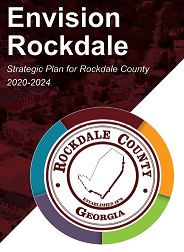Department Menu
Tax Facts and FAQ
What is the meaning of ad valorem and property taxes?
Ad Valorem is Latin for “according to value” and is thought to be a fair basis for collecting taxes because you pay your proportional share based upon the value of your property and the benefits you gain from the services the county provides. It is a local tax that reflects local budget priorities.
Who determines the value of my property for tax purposes?
The Rockdale County Board of Assessors determines your property value. This responsibility is managed by the Chief Appraiser, under the supervision of the Board of Assessors.
Who appoints the Board of Assessors and the Chief Appraiser?
The members of the Board of Assessors are appointed by the Rockdale County Board of Commissioners. The Chief Appraiser is appointed by the Board of Assessors.
How can I contact the Board of Assessors?
Office: 770-278-7676
Fax: 770-278-8906
Rockdale County Board of Assessors
P.O. Box 562
Conyers, GA 30012
Email: boa@rockdalecountyga.gov
What control does the Board of Commissioners have over the Board of Assessors Office?
None, with the exception that the Board of Commissioners retains budgetary control over this office.
What level of laws govern the Board of Assessors?
The Board of Assessors is governed by state law and provisions of the Georgia Constitution.
If I do not agree with the governing laws, who can I turn to?
If you feel the laws governing taxation can be improved, you may contact your State representative(s)/legislator(s) to discuss your concerns and suggestions.
Does the Tax Commissioner report to or control the Board of Assessors?
No. The Tax Commissioner is an elected position.
What is the main duty of the Tax Commissioner in the ad valorem taxation process?
The main duty of the Tax Commissioner is to collect taxes assessed through application of the ad valorem process.
What determines an individual property tax amount?
Your tax amount is calculated using a combination of your property value and the millage rate.
What is the arithmetic of the process?
Here is an example calculation that illustrates the process:
Market Value = $100,000
X assessment value rate 0.40
= assessed value: $40,000
– exemptions: $10,000
= taxable assessed value: $30,000
X mil rate: 0.041
= your tax bill: $1,230
What is the meaning of the term “tax digest?”
The tax digest is the sum of all the assessed values, after exemptions, of properties to be taxed within a particular jurisdiction.
What are the steps used by the Board of Assessors when appraising my property?
The Board of Assessors uses three approaches in appraising your property:
The sales comparison – based on sales prices of comparable properties.
The cost approach – based on the estimated costs of replacement or reproduction of structures, less accumulated depreciation, plus land value.
The income capitalization process – based on how investors estimate the present worth of future benefits of income producing properties.
What is the difference between sales price and market value?
“Market Value” is a theoretical notion of what a knowledgeable buyer would pay for the property and a willing seller would accept for the property at an arm’s length bona fide sale. “Sales Price” is a historical fact from a particular transaction which may or may not reflect the conditions of a normal market.
What is the assessment value in Georgia, and who sets it?
The assessment percentage is 40% of market, and is set according to the laws of Georgia.
If my property value and assessment remain the same, can my tax bill change?
Yes. The tax rate is the product of two items – the assessed value and the mill rate; a change in either can impact your tax bill.
How can I have a tax increase with no mill rate change?
A change in your assessed value or the loss of an exemption could produce a tax increase for you. The millage rate alone does not constitute “taxes.”
What constitutes a millage rate?
The millage rate is calculated by dividing the total amount of money to be collected through property taxes by the total value of the tax digest.
Who sets these rates?
Millage rates are set by the Board of Education, the Board of Commissioners, and if applicable, the City Council.
Do I get an exemption from some assessed value and a reduction in taxes because I own a home and live in it?
Beginning June 1, 2005, a homeowner may file an application for homestead exemption for their home and land acquired prior to January 1 of the taxable year, up to and including April 1 of the taxable year. Failure to apply by the deadline will result in loss of the exemption for that year.
Are there any other special exemptions?
Yes. There are several special exemptions which are on file in the Tax Commissioner’s Office. You can also go to our exemptions information page for additional information and points of contact.
I own a business. Are there any exemptions I may qualify for?
Yes – Freeport Exemption Application
What latitude does the Board of Assessors have to extend deadlines for filing Freeport or Homestead exemptions?
None. The law does not provide grace periods.
I disagree with my appraised value. Are there any avenues for appeal?
Yes, provided you have appeal rights for any given year. The grounds for appeal are:
Value
Taxability
Uniformity
Denial of Exemption
The avenues available to you for appeal are:
The Board of Assessors
The Board of Equalization or Arbitration
Arbitration
Superior Court
Hearing Officer
What are my responsibilities, obligations, and procedures for an appeal?
Appeals may be started in response to assessment change notices generated by the Board of Assessors. You can file a return between January 1 and April 1 declaring your opinion of value, or the Board of Assessors may reappraise your property. Either of these actions will result in an Assessment Change Notice. Once you receive a change notice, you must respond before the deadline included in the notice.
What kind of information can I provide to help the appeal process work better?
You are invited to provide transaction information and photographs of similar properties that have sold recently.
Is the objective of the Board of Assessors to generate as much revenue as possible by keeping the assessed values up?
No. The function of the Board of Assessors is to value all properties at Fair Market Value. Budgets are the focus of other departments. The State of Georgia evaluates the Board of Assessors and its tax digest for accuracy and conducts statistical sample tests. The objective of the office is to have Rockdale’s total assessed values correct when the State reviews them. Failure to meet State standards for accuracy can result in penalties against the Board of Assessors, a loss of State funds and additional state taxes.
What is the Board of Equalization and are there any costs for its services?
The Board of Equalization is a body selected and appointed by the Grand Jury, and is composed of citizens who are eligible to serve on a grand jury. There are no costs to you for using the services of the Board of Equalization in an appeal.
What is arbitration and are there costs to me as an appellant?
Arbitration is an option that you may use as an alternative to having an appeal heard by the Board of Equalization. The loser must pay the cost of the arbitrator and may be appealed to Superior Court.
What are the costs for a Superior Court appeal?
A Superior Court appeal requires a $25.00 filing fee.
How can my appeal be heard by a hearing officer?
The property must be in excess of $750,000 and non-homestead.
If I appeal my valuation, will the resulting decision be used in future years?
Under State law, the Board of Assessors cannot alter the decision of the Board of Equalization or Superior Court for an additional two years without an on-site inspection of the property.
Address
The Board of Assessors
958 Milstead Ave, Suite 101
(mail not received at this address)
P.O. Box 562
Conyers, GA 30012
Office Hours: 8:00 a.m. - 5:00 p.m.
Monday through Friday
Numbers
Telephone: (770) 278-7676
Fax: (770) 278-8906
Emails
To Request Property Information:
boa@rockdalecountyga.gov








